A Welsh corgi’s pregnancy is an exciting time, as you wait for a hoard of mini corgis. It is also a rewarding journey for your pregnant pup! These tiny herder dogs are known for their strong, athletic, and lively demeanor. A litter of puppies who are affectionate and companionable without being needy is worth waiting for. These little pups are even a favorite among royals! This comprehensive guide will walk you through the gestation period, weekly milestones, and care tips for a healthy and happy corgi pregnancy.
Corgis — like other dog breeds — are pregnant for around 63 days from the time of ovulation. This approximation can vary slightly. They go through three trimesters of pregnancy, with each trimester lasting approximately 21 days. During this time, as an obedient owner, you will monitor your pup’s health and well-being. This is the time to prepare yourself as well as your mama corgi for her puppies’ arrival. You will witness amazing changes in your furry companion as she nurtures the tiny bodies inside her.
To make this journey as smooth as possible, we’ve compiled essential information on what to expect each week and several vital care tips to support your corgi’s pregnancy. From dietary adjustments to exercise routines, our guide will help you every step of the way.
Join us as we delve into corgi pregnancy. And prepare to welcome a litter of intelligent, enthusiastic, and adorable little worker puppies into your life.
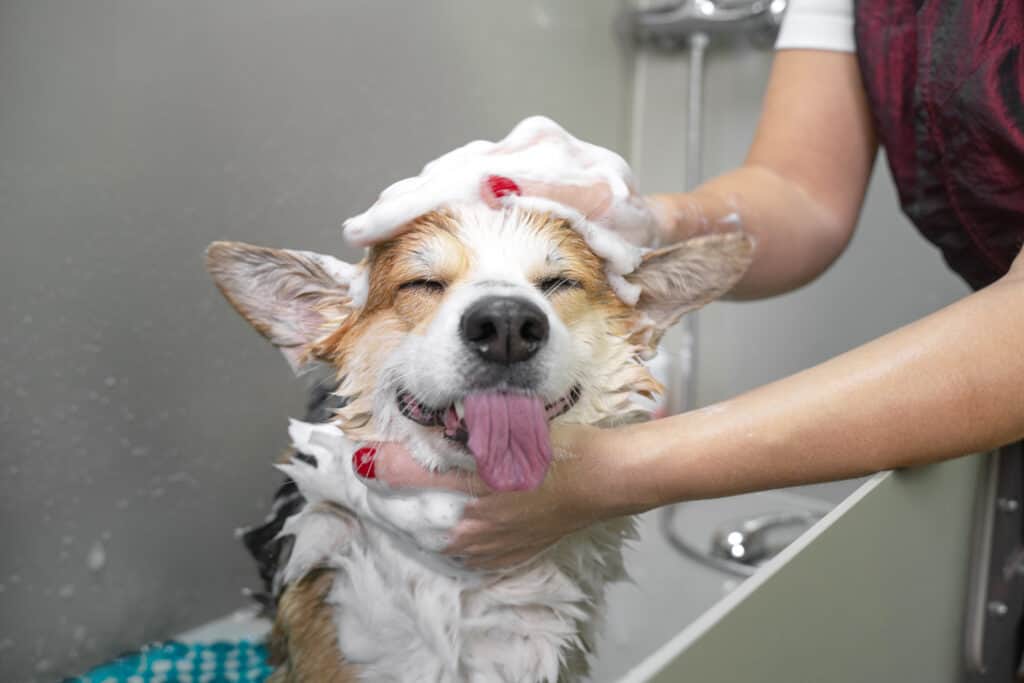
The Pembroke Welsh corgi is a favorite breed of Queen Elizabeth II.
©Masarik/Shutterstock.com
Overview: Welsh Corgi
The Welsh corgi is one of the most agreeable small house dogs. They are loyal and make loving pets for the whole family. The dog is a small dog that originated from the countryside of Wales. The herding dogs are also bred to be family companions and guardians of the farm. Even today, these dogs are still expert herders, and aren’t above a little nip to make sure everyone falls in line!
There are two distinct breeds of Welsh corgis: the Cardigan and the Pembroke. The Cardigan corgi is stocky with a foxlike tail whereas the Pembroke corgi has a slighter build with a docked tail as it descends from the Nordic spitz.
Corgis have short, thick weatherproof coats that range from a rich red or fawn to black or sable with white markings. They usually have dark eyes, but occasionally, and rarely, have light blue eyes.
The small compact dogs are friendly and easy to train due to their intelligence and enthusiasm to herd. The best time to do this is during its first four months of age because corgi puppies want to be clean and what to do what you want to do.

A corgi has a face that resembles that of a fox.
©iStock.com/Tatomm
Quick Overview of Care
The playful and friendly breeds do give a lot of affection, but this manifests into a sort of manic energy. They require daily walks so you can allow them to get rid of their big spurts of activity. Corgis are also happy curling up on your lap and doing absolutely nothing but looking adorable. The short-haired breed requires daily brushing because they shed regularly. If the constant brushing is accompanied by a bath, it loosens excess hair and keeps the energetic dogs looking healthy.
Corgis make excellent family dogs. However, if your family contains children under five, they are not recommended due to the pup’s ingrained desire to herd. They are social dogs that need a lot of stimulation and affection, so make sure you and your family have the time to spend with them.
The corgi is a perfect companion for active individuals, families, and even older couples who need a companion. Their intelligence, loyalty, and cute little faces make them the perfect addition to your home.
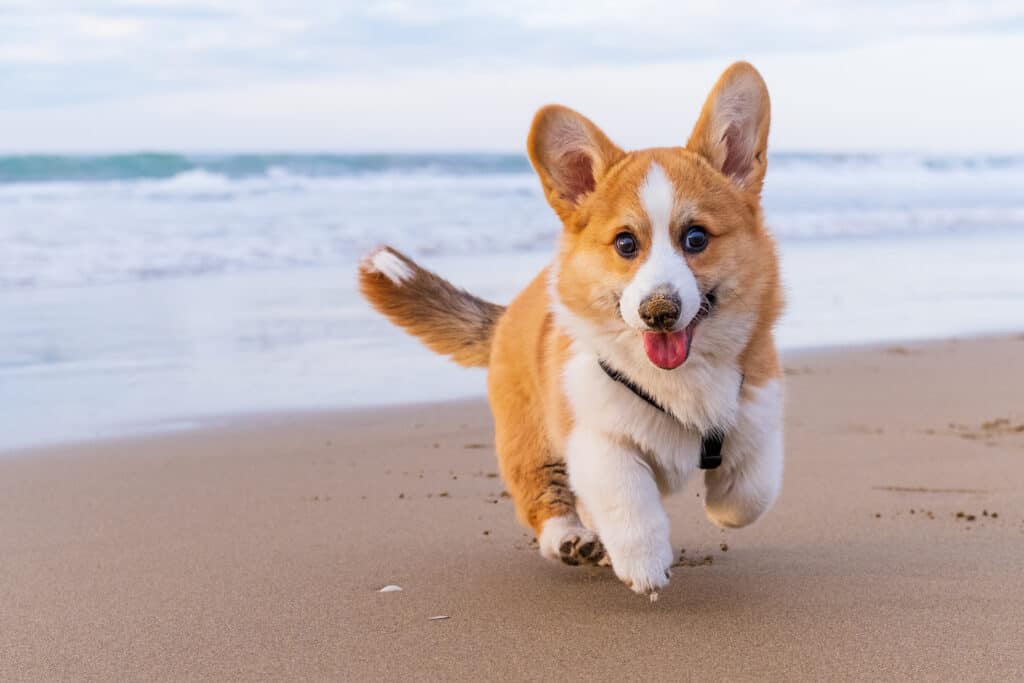
Corgis love playing fetch, tug-of-war, and finding treats hidden in interactive puzzles.
©iStock.com/Karyna Demianiuk
Corgi Pregnancy Symptoms and Signs
Once you breed your corgi, you’ll want to watch for signs and symptoms of pregnancy. Your vet can also confirm the pregnancy with an ultrasound or blood test. You want to pay attention to the signs and symptoms your Corgi may be exhibiting because dogs don’t typically show physical signs of pregnancy until about day 40. This is when their belly will noticeably expand, continuing to do so for around three weeks. A corgi’s pregnancy signs include:
Decreased Energy
These breeds are full of energy. If your corgi abruptly changes its behavior and stops being its energetic self, it could easily be pregnant. Pregnant dogs lose energy due to the stress that pregnancy puts on a female dog’s hormones.
This change usually starts around week two of pregnancy. Your pup’s weariness and lethargy will be noticeable because she will tire more readily. She may also be less interested in activities she loves such as fetch and tug-of-war. And though corgi’s love their naps, a pregnant corgi may take more than usual.
Appetite Changes
Pay attention to your pup’s eating habits. If your corgi eats more or sometimes less than usual, it could be that they are pregnant. Just like a human, a dog eats more because the canine has more mouths to feed. With corgis, an average litter means five to six more mouths!
If your furry friend is healthy but seems to be eating less, they could have pregnancy sickness and feel nauseous. This occurs during the initial weeks of pregnancy. A pregnant dog can also have a decrease in appetite in the final hours before she gives birth. In any situation, you should take your dog to the vet and set out a plan on what to feed your dog. You want to make sure you are feeding your corgi a high-quality diet that has adequate levels of protein, carbohydrates, and fat.
Change In Nipples
The most noticeable pregnancy sign in dogs is a change in a dog’s nipples. This happens just two to three weeks after conception. The nipples get slightly larger, pinker, and deeper in color. The biggest change is to the nipples near your corgi’s hind legs.
The reason for this change is the milk gland beneath the nipples being to mature. This makes the nipples expand in preparation for breastfeeding and milk production. Also, increased blood flow in the nipple area that is brought on by pregnancy-related hormone release causes nipple changes. Nipple changes are a reliable sign, and once you see the rapid change, you should bring your dog to the vet.
Weight Gain
With corgis being small, stocky dogs, a change in weight is very noticeable. The breed usually weighs around 30 lbs. max, and a dog’s weight may increase by up to 50% starting around the seventh week. Their waist and stomach enlarge as the puppies grow because they need more space and nutrients. Please avoid overfeeding her during this time.
Though you aren’t going to see this rapid weight gain overnight, there are other changes that occur to a dog’s midsection. Their bellies seem firmer and a bit rounder. You can actually feel their belly to see if any puppies are developing. Puppies get easier to feel as the pregnancy advances.
Behavioral Changes
Changes in behavior may be noticeable just a few days after your corgi becomes pregnant. They may also appear in various ways, depending on the particular dog’s personality. Since corgis are naturally attention-seeking dogs, their levels of attachment and clinginess may increase. However, there is always the chance that your corgi gets irritable and wants to be left alone a little bit more.
Dogs may also exhibit nesting behavior. This is when they search for a quiet, comfortable spot to give birth. They will often gather blankets or towels to create a cozy den. This happens toward the end of pregnancy, and due to the physical discomfort of the pregnancy, your corgi’s nesting behavior will most likely be followed up with increased irritability.
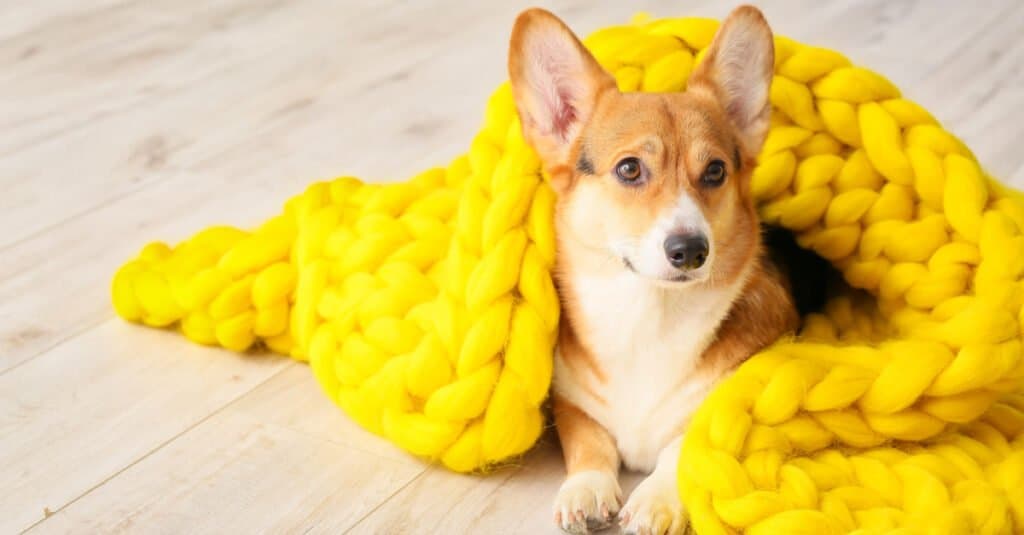
Normal exercise is generally good for pregnant corgis, but it’s best to take it easy in the first two weeks.
©Pixel-Shot/Shutterstock.com
Corgi Gestation Period
Corgis are pregnant for around 63 days from the time of ovulation. This can vary; however, you shouldn’t let a dog go over by more than two to three days before taking them to a vet. They go through three trimesters of pregnancy, with each trimester lasting approximately 21 days.
Three weeks after mating, ultrasonography can confirm pregnancy. Embryos inside amniotic bubbles are easily seen on an ultrasound machine. The following period is crucial for assessing fetal viability.
A complex blood serum test measuring the hormone relaxin concentration can diagnose pregnancy at an early stage.
Here is a detailed breakdown of everything that happens during the gestation period and each month in the three trimesters:
Week 1: Mating and Fertilization
Week one of corgi’s pregnancy involves mating and fertilization. The mating beings during a female dog’s heat cycle. This is when the dog is fertile and ready to mate and lasts between 18 and 21 days. It also occurs around every six months.
Once your corgi mates, multiple eggs fertilize in the upper uterus, around five to six eggs, and they migrate to the uterine horns. You won’t see any physical changes in your dog, however, your corgi experiences hormonal changes during this early phase. Your furry friend should act normal unless there are complications. You should also continue to engage with them as you normally do and play and feed them as usual.
First Month
Just like not every corgi is the same, not every dog shows the same pregnancy symptoms in the first month. However, your corgi’s first month of pregnancy can mean morning sickness, tiredness, and a desire to eat more than usual. Their nipples become enlarged and there is clear vaginal discharge. This continues into the second month. Your corgi may be more clingy than usual, but who doesn’t want a corgi that wants to snuffle in their lap all the time?
Second Month
By the second month of your corgi’s pregnancy, you will notice that they gained a fair amount of weight. Their midsection will feel larger and harder as well. In fact, by day 50, you can see puppies moving in your corgi’s belly. The second month also brings fluctuations in appetite. It usually increases in the first month and at the start of the second, then it drops around day 45 due to more discomfort. You need to continue feeding your corgi as usual, if not even a little more, however, if they aren’t eating, make sure you are feeding them high-quality foods.
Third Month
The third month marks the final period of your corgi’s pregnancy. In this stage, around day 58, the puppies are getting into a position to be born. This causes your corgi’s waist to slim as the puppies move downward. Your pup may act restless, and even shiver, pant, and pace. There is also the possibility of digging. Also, around 12 to 24 hours before your corgi goes into labor, their body temperature will drop. And their appetite will also decrease, so don’t be alarmed.
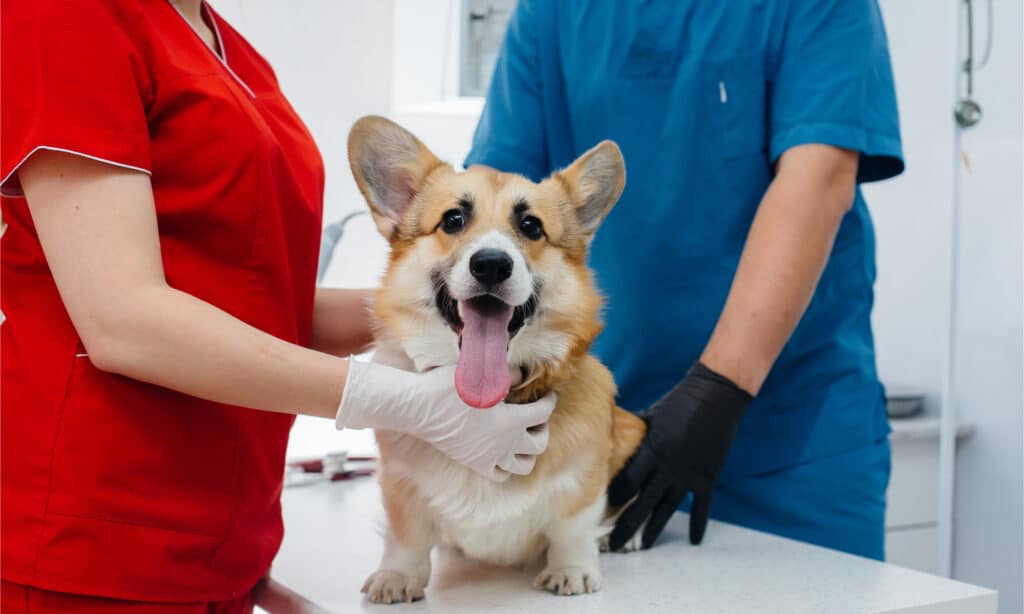
Bring your corgi in for regular check-ups during its pregnancy.
©Andrii Medvednikov/Shutterstock.com
What to Expect During Your Corgi’s Labor
As stated, when your corgi is close to giving birth, they become restless, withdrawn, and even lose their appetite. They will dig or circle in their nesting box and may release red or brown vulvar mucus. However, the moment before they give birth, they will relax knowing they are about to meet their babies.
Create a Whelping Box
If you plan on helping your corgi with her pregnancy, you should prepare a whelping or nesting box for her. It should be big enough for your corgi to stand up, stretch, and comfortably turn around inside. If you can, place the box in a calm, quiet area that is around 71.6 degrees Fahrenheit, and place towels and blankets inside. The sides of the box should be raised to prevent the puppies from falling out during the process. Also, the box should contain a railing inside to prevent the newborns from getting crushed against the walls of the box.

Corgis are identified by their short but powerful legs, big black eyes, compact body, and long ears.
©Natalia Fedosova/Shutterstock.com
Contractions and Birthing Process
Just like humans, corgis have contractions. The first pup is born within 20-30 minutes after the strong contractions, however, if the contractions are weak, the process can take up to four hours. This also may be the time to call or go to the vet.
Time will pass between when each puppy is born. It is called the resting phase and can last up to four hours. Each puppy is covered in thin mucus, but their mother will remove it to allow the puppy to breathe. Though, you may need to step in if this doesn’t happen. The puppies are attached to your corgi by an umbilical cord. Their mother may chew it to break it, but if again, if this doesn’t happen, you can step in and cut it with thread or dental floss.
Again, just like in humans, every puppy is followed by a placenta. It is typically released within 15 minutes, and it is typical for the mother to eat it. However, don’t let her eat too many as it will cause a stomachache. Every puppy should be born within three to 12 hours, though it can even take 24 hours. If the process is taking longer, or any of the placentas do not come out, consult your vet immediately.
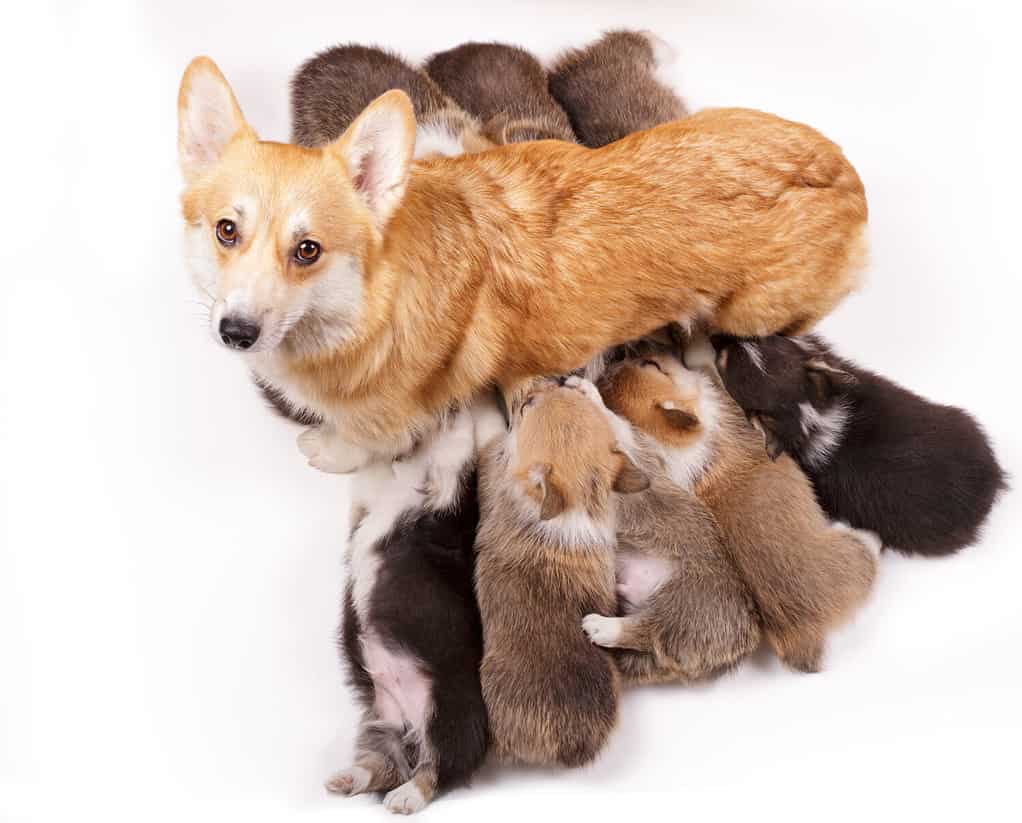
It’s important to let your vet know as soon as you suspect or become aware that your corgi is pregnant.
©Natalia Fedosova/Shutterstock.com
Can Corgis Have Natural Births?
Corgis are a breed with a large head and small pelvis. This combination makes the dogs more prone to difficulties during the birthing process. A female’s pelvis may be too small to pass her puppies’ heads. This would mean a C-section is required for her and her puppies’ health.
When Should You Consult a Vet
If your corgi is pregnant, you should always have a vet on standby during labor. If any of these complications occur, call immediately:
- Your corgi has been pregnant for over 63 days
- No puppies are produced two to three hours after the start of labor
- Over two hours passes between each puppy being born
- Giving birth lasts longer than 12 hours
- Your corgi has strong, regular straining and contractions for 20–30 minutes without producing any puppies
- Thick green/black discharge (normal after the first puppy is born, but not before) without a puppy being produced
- Foul-smelling green/black discharge
- Failing to pass all placentas within four to six hours
- The puppies don’t look quite right
- Excessive amounts of blood
- Your corgi appears to be in serious pain
- Your corgi collapses
- Your corgi isn’t herself
Care After Birth Takes Place
You should let your corgi rest and get to know and bond with her puppies. Put food and water in her nesting box and double the usual amount of high-quality food. It is normal for dogs to reject food for up to 12 hours after giving birth. Also, mother dogs can eat puppy food the last two to three weeks of their pregnancy, and while nursing.
Try to keep your corgi calm. Keep the nesting box quiet and relaxed because you don’t want her to reject her puppies because she’s not in the right state of mind.
Care For the Corgi During the Pregnancy
When your corgi is expecting, regular checkups and nourishment are vital. Here are some tips to ensure a healthy pregnancy:
Proper Nutrition
Feed your pregnant corgi high-quality dog food, preferably one designed for pregnancy and lactation. Increase her portions gradually as pregnancy progresses. Remember, a balanced diet is essential to the health of mothers and puppies.
Gentle Exercise and Mental Stimulation
Moderate exercise is vital during pregnancy but avoid strenuous activities. Choose gentle walks or light playtime instead. Additionally, provide mental stimulation with:
- Gentle walks
- Light playtime
- Puzzle toys
- Gentle training sessions
Grooming and Coat Maintenance
You need to maintain regular grooming sessions to keep your corgi’s coat healthy. The short-legged dogs shed year-round with a severe shed twice a year during the spring and fall. Brushing her coat with a good comb a couple of times a week will clean up the dead undercoat and remove any dust or dirt. Remember to avoid excessive pressure on her belly. Also, when you bathe your corgi, be gentle and if is a stressor for her, find a different solution such as wet clothes and more of a sponge bath approach.
Prenatal Health Checkups
Schedule regular prenatal vet visits to monitor corgi’s health throughout her pregnancy. This includes ultrasounds, blood tests, and parasite prevention. Discuss any concerns or questions with your veterinarian to ensure a smooth pregnancy. Also, listen to your vet if they suggest a C-section as they are common for the breed.
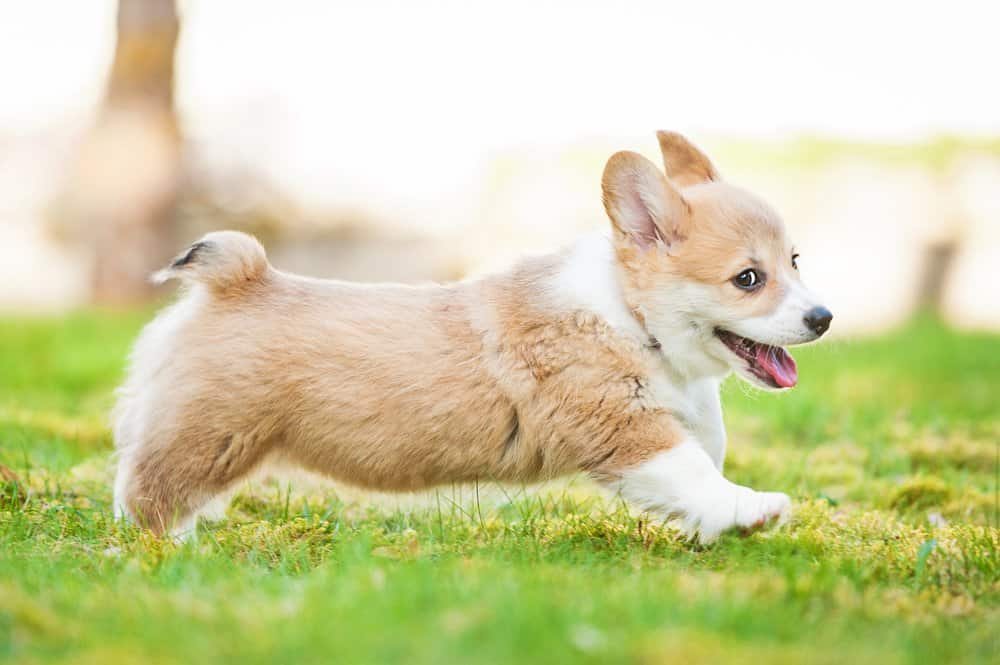
Many Pembroke Welsh corgis are born without a tail!
©Rita_Kochmarjova/Shutterstock.com
Nurturing New Life: Mastering Corgi Pregnancy and Care
Corgi’s pregnancy is an exciting and adorable journey for the mama dog and her owner. Monitoring her three trimesters during the 63-day gestation period all while caring not just for her but for the health of her newborn puppies is a big job. But an exciting one! If you understand the stages of pregnancy as well as the signs and when it may be going downhill, you can support your precious corgi through the miracle of life.
Corgis have similar pregnancies to other dog breeds. If you have a pregnant corgi, the best way to prepare is by speaking with your vet and planning for whelping. The more you know, the easier it will be to address issues as they come. Regular checkups with a veterinarian, a balanced diet, and a comfortable and stress-free environment will all contribute to a successful pregnancy. Which in turn culminates in a healthy litter of little corgi puppies.
The photo featured at the top of this post is © EMT100/Shutterstock.com
Ready to discover the top 10 cutest dog breeds in the entire world?
How about the fastest dogs, the largest dogs and those that are -- quite frankly -- just the kindest dogs on the planet? Each day, AZ Animals sends out lists just like this to our thousands of email subscribers. And the best part? It's FREE. Join today by entering your email below.
Thank you for reading! Have some feedback for us? Contact the AZ Animals editorial team.






